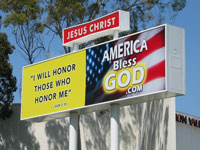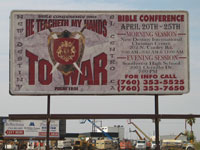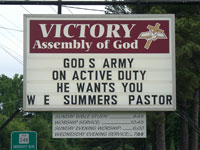
Photo: Mike Doughney/barf.org
Strong title? Perhaps. But that's the kind of feeling I come away with when I read Talk to Action or much of what is written about Christianity in America today.
Why? If there's a root cause for my visceral, negative response to some of what I read, it probably comes from the fact that I don't identify with any particular institution or tradition. No, this is about saving my own skin.
You see, I'm queer. Not as a self-defining identity, but because that's how I'll be viewed should push ever come to shove: as a godless white male, who's lived with a woman for nearly a decade without having gone through the institutional ritual of marriage, who plans on having no children, and who's been outspoken, on the net and on the street, about his point of view. Just those things are enough to put me up aganist the proverbial wall should that time come.
So when I look at that little subtitle of [Talk to Action] - "reclaiming citizenship, history and faith" - sorry, I'm not down with that, and exactly why that is, I'll save for later, if ever.
You know what I think of sometimes when I read Talk to Action? I think of those pickled talking heads in jars that you see in the "Futurama" cartoon. All so neatly shoved into jars, put on a shelf, labeled and perhaps sorted. If you want to keep Dick Nixon at a safe distance away from you, that's easy, 'cause his head is just sitting on a shelf somewhere where you can see where he is and what he's doing. Being a head in a jar, he's probably not doing much.
So it is when I watch what goes on here, the lengthy 'exposes' of the IRD or Chalcedon, the lengthy analysis of the dead like Rushdoony, and the incessant labeling of people and phenomena as "dominionist," "theocratic," "Reconstructionist," or even "Christian right." The labeling of people with labels, that are not the labels those people give to themselves, if anything they would for the most part either look at you blankly if you labeled them that in person, or argue the point.
Along with that labeling is this notion that bounces around here and elsewhere, that somehow all this religious phenomena around us to which we object is somehow indicative of a "false Christianity." Or even, that it's not properly American.
I would reject both the bottling of people and organizations into such easily labeled containers, and the notion that what they are doing is somehow alien. Instead, I'd say that this is simply what Christianity looks like in America in the early twenty-first century: it's a huge, not easily defined organism, with millions of people and billions of dollars. It's the expression of, and it's supported by, common attitudes and assumptions that have both been held for decades if not over a century in this country, attitudes that have never been substantially challenged. Indeed there has been no compelling need to challenge those attitudes, in an environment where threats to existence are both easily defined and distant, while resources are plentiful, and war is cold.
We live in a time where those assumptions will soon crash against the cold hard rocks of reality. These are assumptions of American specialness and supremacy, of righteousness, of evangelical fervor, imposed upon others without others' consent. They're imposed via the missionary seeking individual conversion to Christianity with Bible in one hand and a bag of grain in the other, or a government seeking national conversion to "democracy" with the M-16 in one hand and a suitcase of dollars in the other. Preemptive action on both points, in both senses, that the godless or the undemocratic must change lest they be allowed to someday evolve into a threat, or so their imaginations, fueled by apocalyptic fervor, show them.
Both are completely different expressions of a basic impulse of the American collective psyche. And as long as the water is running, the power is on, and Starbucks and Panera are open for business, it's possible that some will cling to those impulses in perpetuity.

Photo: Mike Doughney/barf.org
Have you ever driven by a church and seen posted on their sign, the phrase, "America Bless God?" In those three words are what, I think, is an often unspoken, core tenet of what Christianity has become: the promoter of the value of cold, hard, reciprocity. America must "bless" God, so that God will "bless" America. Or else.
Inherent in those three words, whether backwards or forwards, is the necessity of complete unanimity of all. One person not "blessing" God threatens the entire provision of God's "blessing" to America. Anyone off the program thus presents some kind of a threat to the basic existence and security of the nation. America, for them, is by definition a Christian nation that must "bless" God and behave accordingly. When they punctuate their agendas with repetitive references to 2 Chronicles 7:14, they are talking about everyone inside the borders of the United States. No exceptions.
But their embrace of reciprocity is much more than that. It mandates an every-man-for-himself-ism, "if a man will not work, he shall not eat." Bankruptcy law, the gutting of welfare, the tying of assistance to faith-based institutions that then implement their own form of reciprocity, tying participation in church activities to assistance necessary for survival, are all examples of how they assume reciprocity must govern all human interaction.
Meanwhile, a consequence of this assumption of reciprocity is its corollary, a source of security and comfort for some, that everything happens for a reason. If things are not going well, then, it can't be because some things are out of your control, or that you don't and can't have the resources to cover all possibilities. There must be a reason. Thus, those who were drowned in New Orleans have only themselves to blame, or thousands died on September 11 because abortion and "homosexuality" exist. It's got to be somebody's fault, and far from simple scapegoating, this is a basic assumption made about how the universe ultimately works.
Lately much has been published on Teen Mania's "BattleCry" campaign. Lost in all the noise is any rational discussion of the basic question, of why something like Teen Mania even exists, why there are tens of thousands of people in their stadium events, and where they are coming from.
Teen Mania, for its own reasons, seldom clearly explains its purpose to the outside world, except to promote a sense of panic and dread over a completely manufactured from thin air "crisis" involving American teenagers. Into that vacuum enter people with active imaginations, like this one who insists the "BattleCry" campaign is some kind of substitute for a military draft, a position for which zero evidence exists. (You'd think that this article, having been crudely illustrated with erect penii, would permanently retire that idea, but evidently not as this comment surfaced in the recent "BattleCry" thread here.)
The purpose of Teen Mania, and the "BattleCry" campaign, is actually quite simple. Baby boomers have been building churches, Christian institutions, parachurch ministries, and businesses over the past few decades, and they fear, correctly or not, that they face a period of decline and fall due to changing demographics. They see a need to aggressively set the conditions such that today's teenagers will become involved with this subculture and stay inside it for the rest of their lives. The desire to live and make a living inside this subculture full-time, interacting with the secular world only on their terms, may be one of the primary drivers of this movement. For this and other reasons we cannot expect it, like other industries past their prime, to go out of business and quietly fade away. (Much of this is evident in Teen Mania's own promotional materials aimed at churches, like this one.)
The potential hazard presented by something like Teen Mania stems from the Christian triumphalist assumption of victory - sometimes shortened to "we've read the end of the book, we know how it ends, we win" - and this notion of reciprocity. If they aren't winning, it must be someone's fault. They'll start by blaming themselves, which can be clearly heard when Ron Luce, and others, during the "BattleCry" events, apologize that his own generation has in some way failed to gain sufficient status and privilege for today's Christian teenagers, as evidenced by, among other things, their self-described failure to challenge secular culture. This was how Luce put it in Detroit:
We've had a whole generation now, no conviction, they've been in church for twenty, thirty, forty years, no conviction, no voice, no passion for God, and this is what happened. And it breaks my heart, I have to tell you the truth, though, you guys. Because my generation, the generation of your parents, did not speak up, they didn't have passion for God, they let the people who do not love God begin to dominate your culture, begin to make stuff that was absolutely unacceptable thirty or forty years ago. Begin to make toys and videos and television and stuff on the air that would have never been accepted, and now you guys are in the middle of a war zone because of a generation of passive Christians. ... On behalf of the older generation, the generation of your parents, we desperately need you to forgive us for not standing up for truth and letting those without faith dominate this culture. It is our fault.
What comes next, and what can be sometimes heard, is the naming of enemies on the outside, starting with the suggestion that secular Americans, by their very existence and by doing a few very simple things, are actively out to get them. This was made very clear when Franklin Graham, speaking at the Philadelphia "BattleCry" event, launched this attack:
But there's a war of culture out there. There are people in this world, they want to take God out of society. They want to take the name of Jesus Christ out of everything that we do. They don't want you to mention Jesus in school, they don't want you to mention Jesus on the street, they don't want you to mention Jesus anywhere. But it's okay to mention Jesus in your church, but don't you mention him outside your church. They want to strip the name of the Lord Jesus Christ out of Christmas. They want that "Happy Holidays," they don't want you to say "Merry Christmas." Why? Because Christ's name is in Christmas.
They don't want you to say "Happy Easter" to somebody, they want to have bunny rabbits at Easter. They don't want the cross at Easter. They don't want you to talk about Jesus Christ comin' up out of the grave, and how he rose, and how God breathed life into his nostrils and brought him back to life and that he's in heaven, he's at the right hand of God. They don't want you to talk about that.
They hate the name of Jesus Christ and they are warring against every standard that God has ever created, not only are they against Christ but every standard of almighty God.
Bunny rabbits of the vast secular conspiracy threaten Franklin Graham. You heard it here first.
So now the development of the "Left Behind" video game is the focus of discussion. For those of us who've watched what Teen Mania has been up to these past few years, though, we've seen similar depictions in their "Acquire the Fire" program over the years, in particular the staging of a full-blown firefight with military weapons against unnamed and unpictured foes in which the ficticious daughter of slain missionaries is depicted in the starring role. It was said to be a dream, but a dream in the context of ambiguity, that reflected a "real" conflict against forces the Christian teenager is supposed to view as a threat.
Another way to view Teen Mania, its programs and its "BattleCry" campaign, is as a barometer of what is going on in the thousands of churches that send people into their programs. They would not send people if they didn't believe that the content was acceptable, or necessary if it isn't; further, they are there because these programs are marketed with the promise of helping perpetuate their churches, with the aim of producing young people who, as Teen Mania used to say, are "on fire" and "plugged in for life" with respect to church and the Christian sub culture. Observing Teen Mania thus provides a window into some of what is normative in those churches, and what churches and the Christian subculture will look like in the future.
In that context, such a video game is inevitable, in fact, it's arriving right on time in relation to what Teen Mania's "BattleCry" campaign presents.
It's from that context that I take issue with Jonathan Huston's comment:
This is religious indoctrination that forms children's identities and teaches that they must be prepared to do a deadly deed to defend their creed. That message is unAmerican and unChristian; patriots and Christians alike should oppose this game.

Photo: Mike Doughney/barf.org
There's nothing un-Christian about Christians defending their faith. What is normative right now is the use of role models from the Bible - in their view, actual historical figures such as David, Josiah and others including the genocidal tribal warriors of ancient Israel - and the exhortation that contemporary teens are to emulate those role models who have destroyed and killed in the furtherance of "God's kingdom." In that context there is again, nothing new here.
I would further strongly disagree that there's something un-American here. In fact, what has America been modeling to its own citizens? The killing of masses of people on the basis of the flimsiest of pretenses, to advance "democracy." This game - or at least, the game as it's been reported thus far - is completely consistent with how much of contemporary America views itself, and if you're hoping to use some claim that this game is something less American than apple pie, I don't expect you to get very far.

Photo: Mike Doughney/barf.org
Meanwhile, the "indoctrination" that makes this game acceptable happens elsewhere - in churches. It's those churches that should be examined, along with the parachurch ministries, networks and publishers that shape what is acceptable, and what is not. Young adults, long accustomed to this kind of imagery and language taught in church, may be the most likely buyers of this game - not children.
In the end always comes the question, what can be done? I often begin by pointing out, opposition can make things worse. In the case of Teen Mania, what we've seen over the past few months is a clueless opposition, devoid of a strategy focused on defusing a potentially volatile situation, that often serves Teen Mania's purposes because it's led by those who seek to parasitically spark their own movement and revolution.
While some may insist that all participants are somehow in complete agreement with the leadership, this is not the case, and here there is work to be done. But it can't be done through labeling them, it can't be done with enormous wordy propagandistic interpretations of what they're doing. It has to be done by addressing what they've actually doing and saying in the context of their self-image, of pulling out what's actually said, word for word, in the context of large events and services, so that when, late one evening, when someone comes to a website of what they think is the opposition, looking for a target to pray over, they are faced with what they earlier heard, but in the quiet of their room, away from the pressure and groupthink of a mass event.
Posted June 12, 2006
Originally posted at Talk to Action